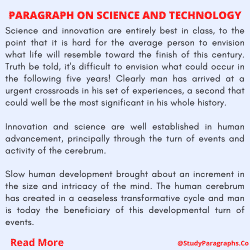Short Essay Paragraph On Wonders Of Science For Class 7 Students
Here you can read an excellent paragraph on the topic, “the wonders of science.” This paragraph was written by one of the best writers for children and students.
Students can learn the latest and most important information about the topic. Read it and don’t hesitate to comment for us.
Wonders Of Modern Science Essay & Paragraph Writing Example For Students
The wonders of science and technology are less about answering questions than about asking them. Scientists and engineers can enumerate a hundred or more problems they want to solve, but the list of great unsolved problems encompasses many fundamental questions about the structure and formation of our universe, as well as the need to discover new sources of energy and ways of producing irreversible damage to our environment to avoid.
The human mind is still by far the most advanced and ingenious information-processing machine we know. One of the reasons humans can do science is because they share with many other species some deeply ingrained, elementary skills for analyzing the structure of the world around them and abstracting general principles. Scientists can formulate problems, explore new solutions, and convince themselves that they have come up with valid answers.
Many modern scientists consider the physical universe to be a kind of machine. They work with models according to which the world can be divided into basic building blocks (atoms, nuclei) and these are arranged into hierarchies (chemical elements, compounds, macromolecules) that interact with one another according to fixed principles. Scientists measure these interactions by quantifying the changes they create in their experimental systems.
Science is one of mankind’s most successful inventions. It owes its success to the fact that it is cumulative. Every new piece of information, every new piece of knowledge, every useful application contributes to a growing wealth of knowledge.
Scientists can study very different phenomena, but by working within recognized frameworks, they can share their findings. For example, the chemical properties of the elements in the periodic table and the way plants use light energy to build organic structures are separate areas of science, but they fit together as parts of a single logical whole.
The interplay of evidence and theory has always been characteristic of science. Physicist Ernest Rutherford is reported to have said: “If you want to find a really solid piece of physics, hypothesize a lot; it’s making them and testing them that matters.” Usually, the best way to go about it is to start with a clue, form a preliminary hypothesis, and then try to test it. Experience has shown that good scientists are not afraid of rejecting hypotheses they once believed to be correct when better ones emerge.
For many people, the essence of science is technological progress, and scientists are considered heroes when their discoveries lead to new devices or medicines. But technology is a more or less inevitable spin-off of real science, not its driving force. Science is made out of sheer love for finding out how things are put together.
Conclusion
That is why we say that the wonders of science are less about answering questions than asking them. Scientists and engineers can enumerate a hundred or more problems they want to solve, but the list of great unsolved problems encompasses many fundamental questions about the structure and formation of our universe, as well as the need to discover new sources of energy and ways of producing irreversible damage to our environment to avoid.

Hello! Welcome to my Blog StudyParagraphs.co. My name is Angelina. I am a college professor. I love reading writing for kids students. This blog is full with valuable knowledge for all class students. Thank you for reading my articles.




